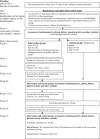A culturally adapted lifestyle intervention addressing a Middle Eastern immigrant population at risk of diabetes, the MEDIM (impact of Migration and Ethnicity on Diabetes In Malmö): study protocol for a randomized controlled trial
- PMID: 24006857
- PMCID: PMC3844588
- DOI: 10.1186/1745-6215-14-279
A culturally adapted lifestyle intervention addressing a Middle Eastern immigrant population at risk of diabetes, the MEDIM (impact of Migration and Ethnicity on Diabetes In Malmö): study protocol for a randomized controlled trial
Abstract
Background: Studies have shown that lifestyle interventions are effective in preventing or delaying the onset of type 2 diabetes in high-risk patients. However, research on the effectiveness of lifestyle interventions in high-risk immigrant populations with different cultural and socioeconomic backgrounds is scarce. The aim was to design a culturally adapted lifestyle intervention for an immigrant population and to evaluate its effectiveness and cost-effectiveness.
Methods/design: In this randomized controlled trial, 308 participants (born in Iraq, living in Malmö, Sweden and at high risk of type 2 diabetes) will be allocated to either a culturally adapted intervention or a control group. The intervention will consist of 10 group counseling sessions focusing on diet, physical activity and behavioral change over 6 months, and the offer of exercise sessions. Cultural adaptation includes gender-specific exercise sessions, and counseling by a health coach community member. The control group will receive the information about healthy lifestyle habits provided by the primary health care center. The primary outcome is change in fasting glucose level. Secondary outcomes are changes in body mass index, insulin sensitivity, physical activity, food habits and health-related quality of life. Measurements will be taken at baseline, after 3 and 6 months. Data will be analyzed by the intention-to-treat approach. The cost-effectiveness during the trial period and over the longer term will be assessed by simulation modeling from patient, health care and societal perspectives.
Discussion: This study will provide a basis to measure the effectiveness of a lifestyle intervention designed for immigrants from the Middle East in terms of improvement in glucose metabolism, and will also assess its cost-effectiveness. Results from this trial may help health care providers and policy makers to adapt and implement lifestyle interventions suitable for this population group that can be conducted in the community.
Trial registration: ClinicalTrials.gov, NCT01420198.
Figures
References
-
- Writing C, Unwin N, Shaw J, Zimmet P, Alberti KGMM. Impaired glucose tolerance and impaired fasting glycaemia: the current status on definition and intervention. Diabet Med. 2002;19:708–723. - PubMed
Publication types
MeSH terms
Substances
Associated data
LinkOut - more resources
Full Text Sources
Other Literature Sources
Medical


